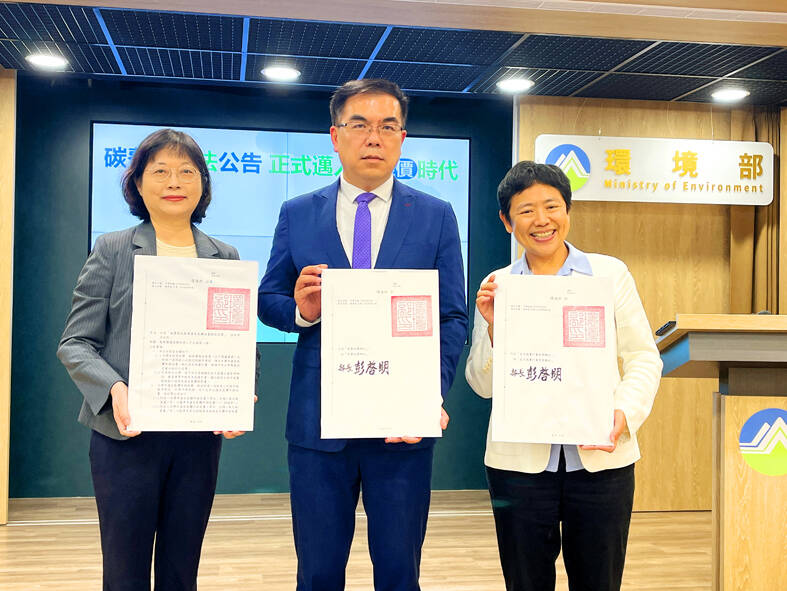The Ministry of Environment yesterday unveiled regulations governing carbon fee collection, autonomous emission reduction and greenhouse gas reduction targets for carbon fee payers in a bid to prepare industries for carbon pricing.
Fee collection would not begin until 2026, with next year to be a preparation window for fee-paying enterprises, the ministry said.
However, fee-liable businesses would still be required to report their 2024 emissions during this grace period.

Photo: Chen Chia-yi, Taipei Times
Taiwan’s carbon fee scheme would apply to 281 electric utility companies, natural gas suppliers and manufacturers who accounted for 54 percent of the nation’s total carbon emissions per year, officials said.
The criteria for paying carbon fees is ownership of an industrial facility that emits at least 25,000 tonnes of carbon a year, of which there are 500, they said.
The data are based on a 2002 industrial survey, the officials said.
The fifth carbon fee assessment and evaluation conference is to convene on Sept. 9 to set carbon rates and formalize a timetable by the end of the year, Minister of Environment Peng Chi-ming (彭啟明) said.
Companies are expected to submit emission reports starting in May next year and payments would commence the following year, he said.
The tentative schedule is designed to give enterprises sufficient time to set corporate emission reduction targets for 2030 and submit action plans to achieve that goal to the government, Peng said.
Climate Change Administration Director-General Tsai Ling-yi (蔡玲儀) said that 10 government-business conferences would be held to facilitate the adoption of reduction strategies and technologies.
Carbon fee payers may buy domestic carbon credits from voluntary reduction projects at a discount of one carbon credit for 1.2 tonnes of emissions capped at 10 percent of chargeable emissions, ministry officials said.
Enterprises not engaged in high-emission activities would be allowed to buy domestic or approved international carbon credits at a discount of one carbon credit for 1.3 tonnes of emission capped at 5 percent of chargeable emissions, they said.
Meanwhile, Taiwan Carbon Solution Exchange (TCX) chief executive officer Joshua Tien (田建中) said Taiwan’s domestic carbon credit exchange platform would launch on Oct. 2.
Tien told a forum on Wednesday that the TCX had been engaged in discussions with the ministry over the details of domestic carbon credit trading since related regulations came into effect on Aug. 15.
As a carbon fee scheme has yet to begin, the trading platform would mainly be for those planning to build new factories, he said.
Regulations announced in October last year require those setting up new factories of a particular scale and developers of high-rise construction projects to partly offset newly generated emissions by buying carbon credits from voluntary projects or implementing other offsetting measures.
Carbon credits generated from offsetting projects would be able to be sold on the platform first to buyers seeking to meet environment assessment requirements, such as construction and development projects, Tien said.
He said domestic carbon credits could be used to partly offset soon-to-be-collected carbon fees, adding that purchasing carbon credits would be better for corporate image than simply paying the fees.
Chargeable emissions would be calculated from the date the carbon fee rate is officially announced.

Chinese spouse and influencer Guan Guan’s (關關) residency permit has been revoked for repeatedly posting pro-China videos that threaten national security, the National Immigration Agency confirmed today. Guan Guan has said many controversial statements in her videos posted to Douyin (抖音), including “the red flag will soon be painted all over Taiwan” and “Taiwan is an inseparable part of China,” and expressing hope for expedited reunification. The agency last year received multiple reports alleging that Guan Guan had advocated for armed reunification. After verifying the reports, the agency last month issued a notice requiring her to appear and explain her actions. Guan

GIVE AND TAKE: Blood demand continues to rise each year, while fewer young donors are available due to the nation’s falling birthrate, a doctor said Blood donors can redeem points earned from donations to obtain limited edition Formosan black bear travel mugs, the Kaohsiung Blood Center said yesterday, as it announced a goal of stocking 20,000 units of blood prior to the Lunar New Year. The last month of the lunar year is National Blood Donation Month, when local centers seek to stockpile blood for use during the Lunar New Year holiday. The blood demand in southern Taiwan — including Tainan and Kaohsiung, as well as Chiayi, Pingtung, Penghu and Taitung counties — is about 2,000 units per day, the center said. The donation campaign aims to boost

The Kaohsiung Tourism Bureau audited six hotels in an effort to prevent price gouging ahead of Korean band BTS’ concert tour in the city scheduled for Nov. 19, 21 and 22 this year. The bureau on Friday said that the audits — conducted in response to allegations of unfair pricing posted on social media — found no wrongdoing. These establishments included the local branches of Chateau de Chine, Hotel Nikko, My Humble House, and Grand Hai Lai, it said, adding that the Consumer Protection Commission would have penalized price gougers had the accusations been substantiated. The bureau said the Tourism Development Act

The Central Weather Administration (CWA) said a magnitude 4.9 earthquake that struck off the coast of eastern Taiwan yesterday was an independent event and part of a stress-adjustment process. The earthquake occurred at 4:47pm, with its epicenter at sea about 45.4km south of Yilan County Hall at a depth of 5.9km, the CWA said. The quake's intensity, which gauges the actual effects of a temblor, was highest in several townships in Yilan and neighboring Hualien County, where it measured 4 on Taiwan's seven-tier intensity scale, the CWA said. Lin Po-yu (林柏佑), a division chief at the CWA's Seismological Center, told a news conference